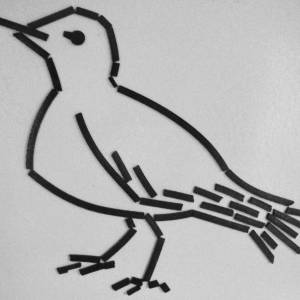Ripples
Warning: it may be better to simply skip this entry. It is long and convoluted.
While getting out of the house for a walk today my eye was caught by the perfect circles rippling out from this small moth on its back struggling in the water. For the record, I did not just passively document its woe but, after taking a few pictures, carefully fished it out with a stick and went on my way.
This, of course, brought to mind the "butterfly effect." No, not in the mathematical sense, but in the more colloquial sense of "how might this small thing I do effect the future?" I actually think I was hip to this idea early on, since I was a nerdy child who read a lot of science fiction at a young age. I came across Ray Bradbury's classic story "A Sound of Thunder" as a kid and so had a personal connection to the concept growing up. When I was young I understood the moral of the story as the amusing philosophical novelty it was, since there is a lot of that sort of thing in early science fiction. As I got older I started to get a more nuanced view of the phenomenon. In the story someone kills a butterfly in the past, which causes negative outcomes in the future. "But," (I would think) "what if someone saved a butterfly in the past, and that caused negative outcomes in the future?" I think that poses a more interesting philosophical question. For aren't we acting in the past of some possible future? Who is to say what is good for one thing may not be bad for many others? How are we to know if our actions will be beneficial in the long run?
Loren Eiseley has an interesting account about a "star thrower" which has become as oversimplified in the popular imagination as Ray Bradbury's story. But the oversimplification doesn't work for me. So you save a starfish by throwing it back into the sea, but who is to say you haven't just harmed a seagull looking for food? This isn't such an odd thought really, because just today when I was fishing out that moth there was a junco or something frittering about on a nearby tree. On reflection, I think it's possible I startled that bird and caused it to drop that moth in the stream to begin with.
Ultimately I find the Trolley Problem to be a more useful and mature way to approach these sort of ethical dilemmas. But it's harder to popularize stories with moral ambiguity, especially if they involve pushing fat people in front of trains.
I'm afraid this is the kind of thing I find myself thinking about while I'm wandering about semi-lost in the woods because I spontaneously followed a side trail into a surprisingly involved network of old cart roads. But then again, that's also why I like to walk in the woods. Sometimes it can feel like dreaming, and when I get back home my subconscious has had a chance to reset. And if I write it down, even better. Then my poor wife hopefully won't have to listen me ramble.
Recall that I did, after all, pull the moth out of the water. It was gone when I checked on the way back. I don't know if the bird ate it. By that point it was sort of raining.

Comments
Sign in or get an account to comment.


